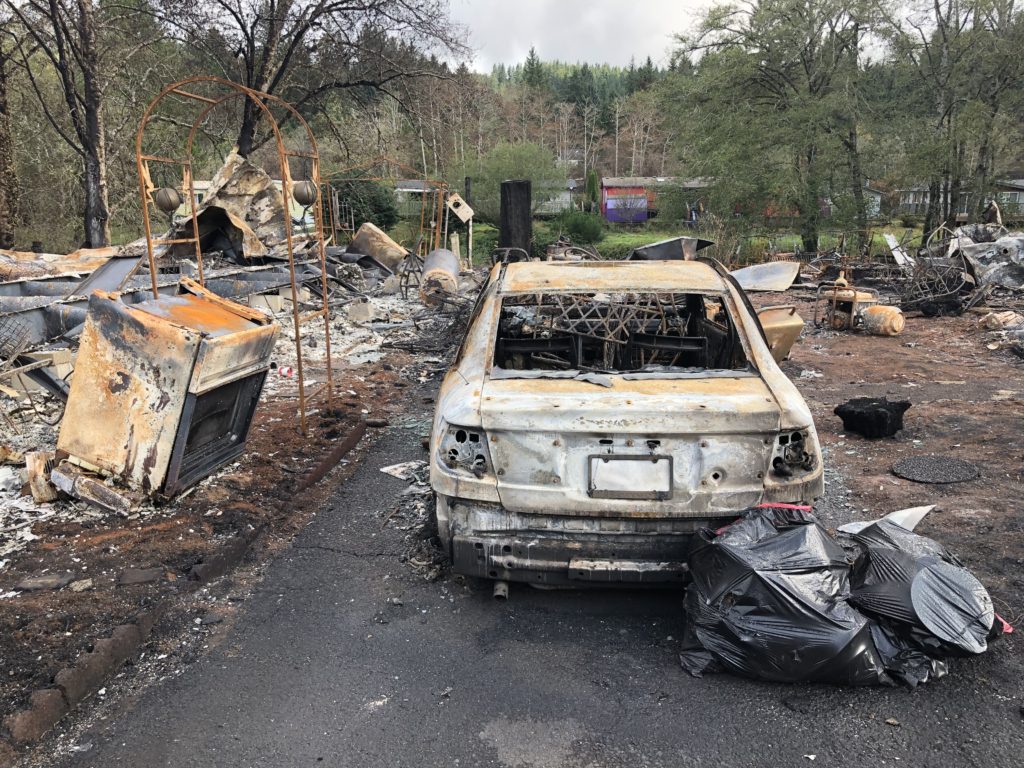
By ALEX BAUMHARDT/Oregon Capital Chronicle
After more than five years of waiting in some cases, wildfire survivors across the West will be relieved of paying federal income taxes on their recovery settlements and lawyers fees.
The Federal Disaster Tax Relief Act passed the Senate on Wednesday night, about six months after it was approved by the House of Representatives nearly unanimously. It had been stalled for months, tucked into opposing tax packages from Senate Republicans and Democrats.
The bill, which is likely to be signed by President Joe Biden, would exempt people who have survived a wildfire between 2016 and 2026 from paying federal income taxes on disaster recovery settlements and fees paid to lawyers that were received or paid between 2020 and 2026.
Victims elsewhere are also likely to benefit. The bill applies to the survivors of the East Palestine train derailment that occurred in Ohio in 2023, although they’ve largely been exempted from federal income tax on payments from Norfolk Southern due to intervention from the Internal Revenue Service.
The disaster act would also provide relief for natural disaster survivors since 2020 in the form of a casualty loss deduction. That means that those who only received partial payments from insurers on home damage and other residential property damage could deduct those uncovered losses on their federal income taxes without itemization.
Passage of the bill, introduced last year by a Florida Republican Rep. W. Gregory Steube, follows a public plea last month by a political action committee. American Disaster Relief sponsored billboards asking for help in Idaho and Oregon to grab the attention of the two leaders of the Senate Finance Committee where the bill sat. Oregon’s senior senator, Democrat Ron Wyden, chairs the committee, and Idaho’s Sen. Mike Crapo is its ranking Republican member.
The bill would sunset in 2026, according to Wyden spokesman Hank Stern, because federal tax codes are coming up for negotiation in 2025 and there is not a lot of political will among Republicans to do long-term tax policy in the lame duck session before a new Congress and administration comes to power in January. Wyden said in a speech following the bill’s passage that it was necessary and long overdue.
“Their homes and their businesses are burned, their possessions and livelihoods gone, and finally, the federal government is showing some common sense,” he said.
He and California House and Senate Democrats and Republicans who championed the bill said despite working in a bipartisan way to get it passed in the Republican-controlled House, Senate Republicans stalled progress.
“We’re going to be able to say to Westerners who’ve been hit by these big fires that they’re going to be able to go to bed tonight in the Western United States with a little relief that the federal government has finally come to its senses and made sure that they’re not going to have this additional tax burden,” Wyden said in his speech.
Oregon Republicans also welcomed the bill, including state Rep. Christine Goodwin of Canyonville, who worked on a similar bill passed by Oregon’s Legislature.
“When I first wrote Oregon’s framework for wildfire disaster tax relief, I did so with the belief that government should not profit from the misfortune of its citizens. It took Rep. Jami Cate and I many years to get the bill over the line here in Oregon; I’m happy to see similar efforts happen so swiftly at the federal level.”
The state bill passed unanimously in the spring of 2024, ending state income taxation on settlements and lawyer fees for wildfire victims. That bill, Senate Bill 1520, was championed by survivors of the 2020 Labor Day Fires, including Sam Drevo, who survived the Santiam Canyon fire that burned down much of the city of Gates in the heart of the Santiam State Forest.
“On behalf of fire survivors everywhere, I am deeply grateful that this passed. I’m not super thrilled about the sunset, but it’s a huge step forward for fire survivors,” Drevo said.
He and his mom are still sorting out how much she was taxed on the settlement she received to help her rebuild her home in Gates that was completely wiped out by the fires.
“I know it’s going to be helpful, and to other people it’s going to be helpful. In general, it’s a huge thing to have this type of tax relief, especially in a situation where you lose everything,” he said.
- Oregon Capital Chronicle is a nonprofit Salem-based news service that focuses its reporting on Oregon state government, politics and policy.



